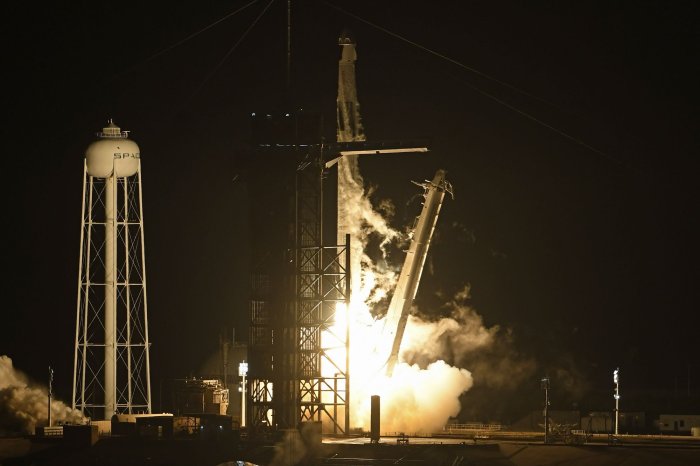1 of 5 | Astronauts Matthias Maurer, of the European Space Agency, and Kayla Barron (rear from left), with Tom Marshburn and Raja Chari (front from left) of NASA, prepare to launch from Kennedy Space Center in Florida in November. File Photo by Joe Marino/UPI |
License Photo
ORLANDO, Fla., Feb. 16 (UPI) -- Europe needs its own crewed spaceship to build its space industry and talent, astronauts who gathered in France said in an official manifesto Wednesday.
Dozens of astronauts endorsed the statement that "we need to be able to count on our own autonomous access to space for humans," according to the manifesto presented at the 2022 European Space Summit in Toulouse.
It calls on European officials to fund such a new space endeavor.
Europe has seven active-duty astronauts and has launched many more, but only on U.S. space shuttles, SpaceX Dragon capsules and Russian Soyuz capsules.
Europe itself uses Ariane 5 rockets to launch satellites but has no crewed vehicle.
There are several reasons the call for a new spacecraft is timely now, Italian astronaut Luca Parmitano told UPI.
"If you look around in Europe right now, there is a vibrancy, a specific frequency of energy that you can feel when you walk into a room to talk about space," Parmitano said.
He said the European Space Agency's selection of new astronauts this year prompted many in the agency to think about the future.
Two European astronauts have recently launched to space on a SpaceX mission, Matthias Maurer and Thomas Pesquet, while a third, Samantha Cristoforetti, plans to launch with SpaceX on April 15.
"I would like to be able to tell the new class of astronauts, yes, there is a chance for them to fly into space with a European rocket and operate in space with other Europeans and other international partners and give a demonstration of what we are capable of doing," Parmitano said.
The European space program also was energized by the flawless performance of the Ariane 5 rocket in launching the James Webb Space Telescope in December.
The rocket performed so well, as Europe's contribution to the mission, that the telescope itself had to use minimal fuel to reach its destination. That means it might last twice as long as its original mission profile, according to NASA.
"I believe that it was the time for us astronauts to take a stand and to give direction about ... where we see our role now," Parmitano said.
In a video on Twitter, Cristoforetti added another reason for such a spacecraft, "Europe needs new unifying dreams to keep its talent in Europe."
And finally, Parmitano said costs for building spacecraft have come down steadily since Europe canceled a plan to build a small version of the space shuttle in the 1990s.
"This can be done for billions of dollars now, instead of hundreds of billions," he said.
History and geopolitics also may underlie the call for an independent European spaceship, Amy Foster, a professor of space history at the University of Central Florida, said in an interview.
"It certainly doesn't surprise me, given the tensions with Russia over Ukraine, and the rise of the private space industry around the world," Foster said. "Europe has had to play third wheel in terms of their crewed launches, along with Japan, so maybe it does make sense that this is the right time to stretch their own legs."
She noted that NASA plans to retire the International Space Station in 2030 and move to commercial space stations while planning crewed trips to the moon and Mars.
"I can see why Europe would want to plan for their own crewed presence in space. Cooperation in space between nations, like Russia and the U.S., has always been very challenging," Foster said.
The SpaceX Falcon 9 rocket launches NASA's third crew to the International Space Station at 9:03 p.m. November 10 from the Kennedy Space Center in Florida. Photo by Joe Marino/UPI |
License Photo
















